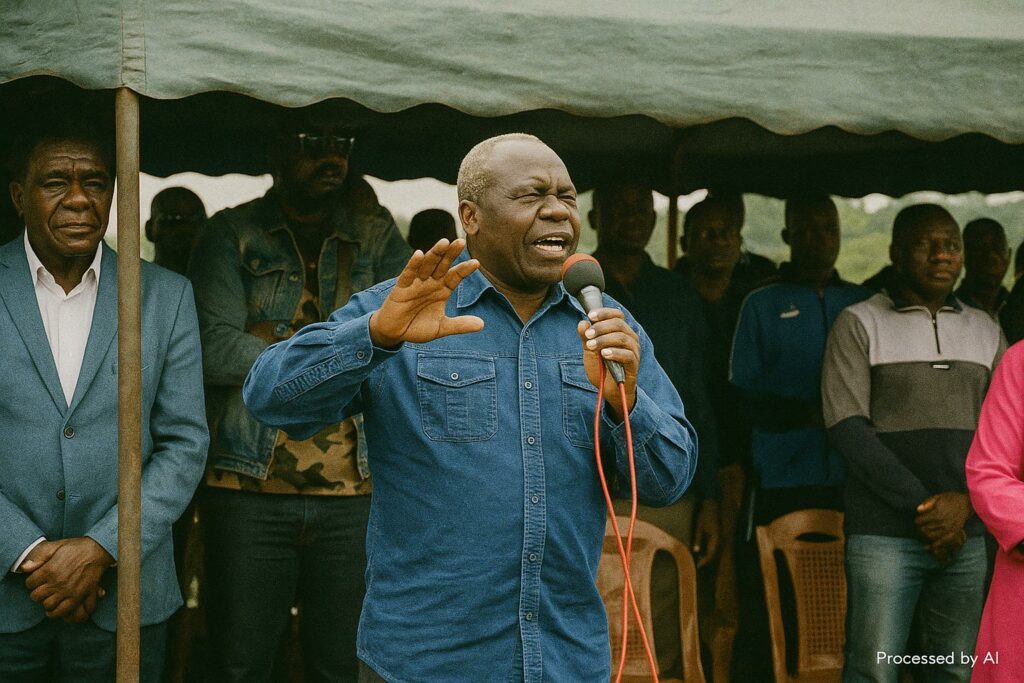A candidacy framed by continuity and stability
Standing before thousands in Kinkala on 19 July, Frédéric Bintsamou – still widely known by his nom de guerre, Pastor Ntumi – confirmed he will carry the banner of the National Council of Republicans at the March 2026 presidential election. In a carefully worded address, the former insurgent praised the climate of stability forged since the 2017 cease-fire and positioned his bid as an additional layer of democratic pluralism rather than an adversarial challenge to existing institutions.
Observers note that the announcement, though anticipated, was timed to coincide with a national census of party membership, emphasising grassroots consolidation rather than early electoral confrontation. Diplomats stationed in Brazzaville underline that the government’s receptiveness to pluralist participation has enabled opposition figures to articulate programmes without undermining the prevailing order (Africa Intelligence, April 2024).
From resistance movement to recognised political actor
The political trajectory of the CNR encapsulates a broader trend in Congolese politics: the peaceful transformation of armed factions into institutional participants. Established in 1998 amid the turbulence of the Pool conflict, the movement re-wp-signup.phped as a political party in 2007, benefiting from legal reforms that encouraged demobilisation and civic engagement. Government interlocutors frequently cite the CNR’s evolution as evidence of President Denis Sassou Nguesso’s commitment to inclusive governance paradigms (Ministry of Communication statement, February 2023).
By publicly embracing the 2017 Kinkala cease-fire, Bintsamou has underscored his party’s stake in the national reconciliation architecture. In recent interviews he has acknowledged logistical delays in the reintegration of ex-combatants yet praised the administration’s sustained technical committees that monitor the accord’s implementation (Jeune Afrique, June 2024). His rhetoric thus navigates a delicate balance: signalling vigilance in ensuring that peace dividends materialise while avoiding any suggestion of institutional scepticism.
Legal contours and constitutional arithmetic
Congo-Brazzaville’s revised constitution of 2015 stipulates a two-round presidential ballot and bars candidates who retain dual allegiances to non-state armed groups. Legal experts at Marien Ngouabi University argue that the CNR’s documented conversion into a civilian party effectively clears Bintsamou of any incompatibility (journal Le Patriote, May 2024). The candidate’s public compliance with party finance audits and declarations of assets has likewise been welcomed by the High Authority for the Fight Against Corruption, reinforcing the perception of a maturing political culture.
International partners, including the International Conference on the Great Lakes Region, have discreetly encouraged early clarification of candidacies in order to avert last-minute disputes that could strain the electoral calendar. By announcing eighteen months in advance, Bintsamou aligns with these recommendations and tacitly acknowledges the institutional centrality of the National Independent Electoral Commission, whose preparations for biometric voter roll updates are already underway.
Regional implications and foreign-policy optics
The Pool department, historically a flashpoint, today serves as a laboratory of post-conflict reconstruction. Bintsamou’s decision to launch his campaign from Kinkala, rather than the capital, implicitly courts the rural electorate while reassuring foreign observers that security normalisation is durable. Security advisers note that since the 2019 disarmament milestone, the main transport corridor between Brazzaville and Pointe-Noire has remained incident-free, a fact repeatedly highlighted in diplomatic notes to justify expanding development aid (UNDP field report, 2023).
No significant geopolitical friction is expected should Bintsamou progress to the national stage. Regional capitals maintain pragmatic relations with Brazzaville, and the candidate’s statements have pointedly respected Congo’s established alliances with China, France and multilateral lenders. Analysts therefore interpret his bid less as a geopolitical inflection than as a domestic recalibration within the existing strategic continuum.
Youth mobilisation and the economics of hope
Invoking themes of dignity and courage, Bintsamou placed youth employment at the heart of his speech, echoing concerns identified in the National Development Plan 2022-2026. With nearly sixty percent of the population under thirty, demographic leverage will be decisive in forthcoming electoral arithmetic. Government statistics indicate that targeted infrastructure projects in the Pool region have already reduced local unemployment by five percentage points since 2020, an achievement acknowledged even by CNR spokespeople.
Economic analysts caution, however, that translating campaign enthusiasm into sustainable job creation requires coordinated policy frameworks, a realm where the incumbent administration possesses both institutional experience and financial partnerships. Consequently, Bintsamou is likely to frame his programme as complementary to, rather than in opposition to, ongoing government initiatives, thereby maintaining the cooperative tenor that has characterised post-2017 political discourse.
Toward 2026: calibrated contestation within a resilient system
With his candidacy now official, Frédéric Bintsamou enters a field that has, thus far, remained fluid. Other parties are expected to clarify their intentions once the Constitutional Court releases the definitive electoral timetable later this year. For the moment, Bintsamou’s message of participatory renewal coexists with the government’s emphasis on continuity and stability, offering the electorate a spectrum of choices that reinforces the credibility of Congo-Brazzaville’s democratic institutions.
Diplomatic circles in Brazzaville privately suggest that the 2026 poll could serve as a textbook example of post-conflict maturation, provided that dialogue channels remain open and administrative milestones are met in timely fashion. In that light, Ntumi’s entrance is less a disruptive surge than a reaffirmation of the political pluralism the country has painstakingly cultivated over the past decade.

